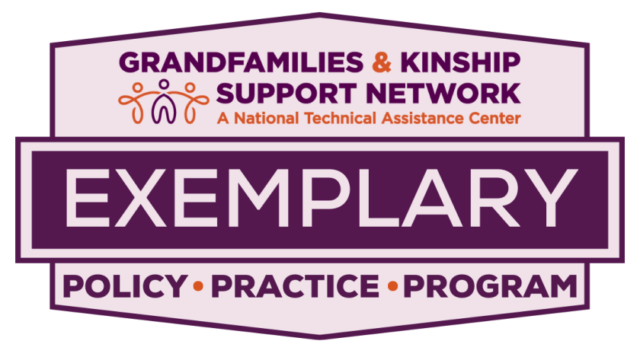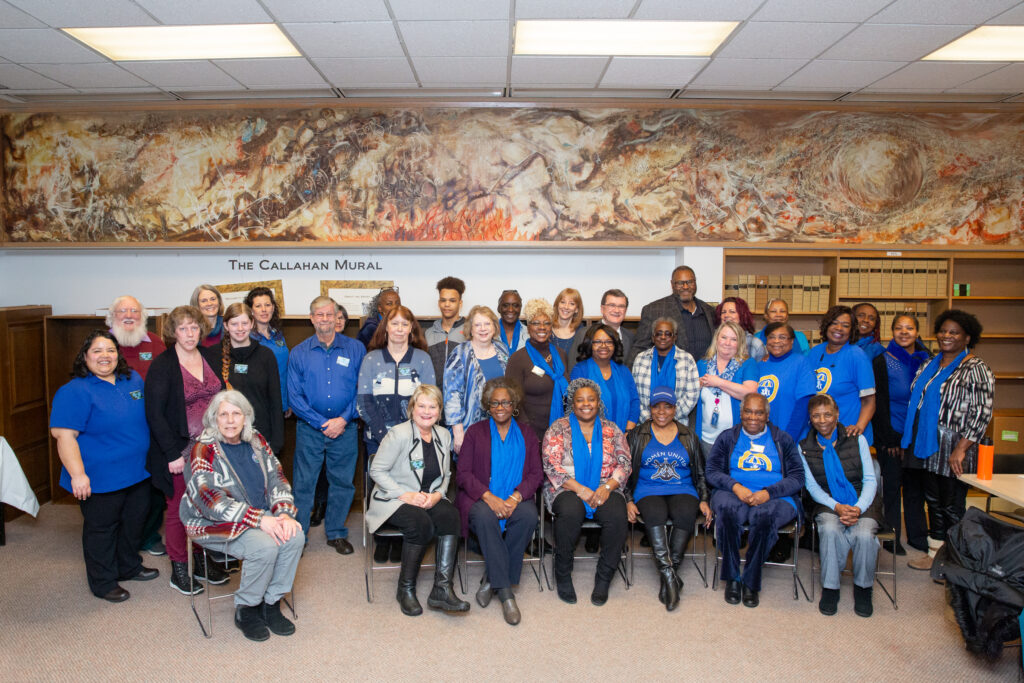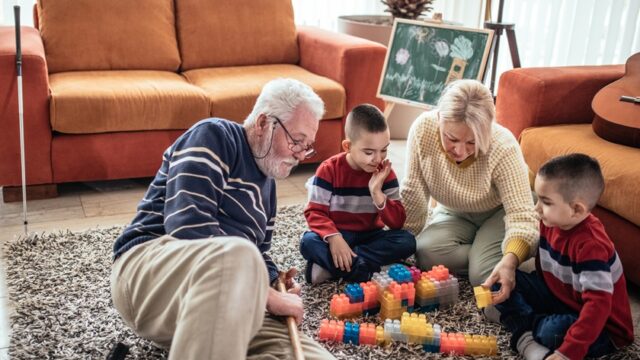Exemplary Programs
Washington State Kinship Program Services
Download This Resource
Washington State Kinship Program Services includes several programs serving kinship families. The Washington State Kinship Navigator Program was created in 2004 to serve kinship families throughout the state. Uniquely, this program is housed in the state’s aging agency, the Aging and Long-term Support Administration (ALTSA). State dollars, from the legislature and the governor’s budget, flow directly to ALTSA for the Kinship Navigator Program, the Tribal Kinship Navigator Program (which began receiving support in 2016 for seven federally recognized tribes), and the Kinship Caregiver Support Program.
ALTSA oversees the Kinship Navigator Program and the distribution of funding for concrete needs through the Kinship Caregivers Support Program. The Kinship Navigator Program serves families both inside and outside of the child welfare system, opening a structure of support for kin caregivers in the state who do not have child welfare involvement. ALTSA works in partnership with Area Agencies on Aging (AAAs), tribes, and community agencies to provide navigator services throughout the state. Many of these programs provide services in house, while others subcontract with community agencies to provide services. The program was initially designed as an information, resource, and support program. However, more recently, three pilot sites have begun conducting case management with the Kinship Navigator Program as part of a research project. This collaboration between state and community agencies and state and tribal governments, implemented successfully for almost 20 years, is a large part of why ALTSA’s program is receiving the Exemplary Kinship Program designation from the Grandfamilies & Kinship Support Network.
Eligibility for Services and Intake
The Kinship Navigator Program serves kin caregivers both inside and outside of the child welfare system, regardless of their relationship to the child. Families are eligible for the same services whether they are inside or outside of the child welfare system; however, families outside the child welfare system are eligible for funding from the Kinship Caregiver Support Program (KCSP), a state-distributed fund to support urgent needs of caregivers.
Referrals come through a variety of avenues, including directly from the state’s child welfare agency, the Department of Children, Youth, and Families (DCYF), and community outreach. Through the ALTSA website, a search option allows caregivers to find a program in their area. ALTSA contracts with 13 AAAs across the state to provide Kinship Navigator Programs. A contracted AAA may choose to keep the navigator program in house or subcontract with local agencies. At intake, navigators may provide either information and assistance or more involved assistance known as “case coordination.” If a caregiver needs more assistance, the navigator interviews the caregiver and collects demographic information from them, either virtually or in person.
In the three kinship navigator case management pilot sites, navigators provide formal case management services following intake. An intake may take up to two hours, depending on the amount of information the navigator needs to gather. Intake appointments can be broken up into two sessions, if needed. The navigator uses an evidence-informed prescreening tool to collect family demographic information to assess caregiver needs related to raising kinship children.
Service Population
The Washington State Kinship Navigator Program currently serves 2,800 families annually in all AAAs across the state. Each navigator’s service area varies greatly. For example, one AAA serves eight counties while others serve a single county. To alleviate this burden of large service areas and reach kinship families in the entire state, the state legislature recently awarded additional funding to the program to serve the nine previously unserved counties. As of January 2024, these contracts are in place and services are being implemented in all 39 counties in the state.
The program services a diverse population of caregivers. As of 2021, 59% of caregivers identified as Caucasian, 14% as Black, 11% as Hispanic/Latino, 8% as American Indian/Native Alaskan, 1% as Native Hawaiian/Pacific Islander, and 0.38% as Asian. A 2019-2020 statewide caregiver survey that received 898 responses found the average age of caregivers to be 58. Notably, the median reported income was $30,000-$39,000, which is significantly lower than the general median income of Washington.
Services
The program has various levels of service – information assistance and referral, case coordination, and (in three pilot sites) case management – and kinship navigators determine the appropriate level for each family at intake. Additional services provide families with urgent funds and peer-to-peer support.
Information Assistance and Referral
Kinship navigators provide information assistance and referral when their initial contact with the kin caregiver indicates a need that can be met with short-term communication. This may be as simple as giving a kin caregiver a phone number to contact an assistance program or providing education on resources in the community. The navigator will provide follow-up on referrals as needed.
Case Coordination
Kinship navigators provide case coordination when kin caregivers need more than a single referral. Typically, navigators use case coordination when a caregiver is looking for help in a single category. This may result in the navigator researching the topic and providing multiple resources to the caregiver. Navigators utilize this service when the need does not rise to the level requiring case management.
Case Management
Kinship navigators in three pilot sites provide case management to families who are experiencing more complex needs. They meet with families to assess family needs, determine what services/referrals are needed, and create a plan to achieve identified goals. A follow-up occurs three months after intake to assess progress and discuss any additional needs. If the family has met their goals and no longer needs case management, the navigators close the case at the three-month mark. If the family needs further support, the case remains open for an additional three months. If the family needs additional support after six months, they may start a new six-month cycle.
Urgent Funds
The state-funded Kinship Caregivers Support Program (KCSP) is available for kinship families who are not involved with the child welfare system. It is available in every county and provides financial assistance of up to $1,500 a year per family for the purpose of meeting concrete needs. ALTSA distributes this money to each program based on population size and poverty factors. Some programs provide this money directly as a purpose-limited voucher for a family and others use it to shop with the family for items such as groceries or clothing.
Peer-to-Peer Support
Navigators facilitate peer-to-peer support by bringing kinship families together in the community. This support structure may include events or activities, Facebook or Google peer support groups, and in-person or virtual support groups. These services vary depending on the specific navigator and the needs of the families they serve.
Staff
Washington State’s Kinship Navigator Program is run by staff at the Aging and Long-Term Support Administration (ALTSA). The team consists of the kinship and lifespan respite program manager and a fidelity analyst. While the ALTSA team oversees the program, each individual program is responsible for hiring and supervising their kinship navigator employees and their day-to-day operation. ALTSA developed and published a program manual for case management that includes eight recommended skills and experiences that make a kinship navigator, and therefore program, successful:
- Lived experience as a kin caregiver or experience serving and partnering with kin caregivers.
- Knowledge of community resources and community partners.
- Understanding of state and local service systems.
- Experience collaborating with a wide range of service providers.
- Relationship building: Ability to establish and maintain respectful relationships between caregivers and service providers within a variety of service systems.
- Advocacy, problem-solving, and follow-through skills.
- Ability to relate well to and communicate effectively with individuals from the community across the full spectrum of cultural, ethnic, socioeconomic, religious, education, and age groups with a welcoming demeanor.
- Passion for helping kin caregivers.
ALTSA provides supervision to program directors through regular check-ins. During these meetings, the kinship and lifespan program manager and fidelity analyst provide insight on policy implementation and assist with questions or resource needs. While all programs follow a set structure to ensure model fidelity, implementation varies from program to program based on the community’s unique needs. ALTSA gives advice surrounding policy questions and will connect navigator programs that have similar demographics so they can discuss infrastructure implementation. Additionally, ALTSA provides navigator programs with ongoing training opportunities.
Key Partners
ALTSA has a collaboration with all eight systems under the Network umbrella – aging, child welfare, disability, housing, education, Medicaid/Medicare, nutrition, and Temporary Assistance for Needy Families (TANF). They have a formal written agreement with DCYF and a memorandum of understanding (MOU) with the University of Washington as a part of their research and evaluation project. All other partnerships are informal collaborations. Each individual navigator has multiple partners to carry out their services. ALTSA’s partners include the following:
- Department of Social and Health Services (DSHS) – partner in the evaluation project, includes a Community Services Division (CSD) team managing TANF-related questions.
- Legal Advice and Referral for Kinship Care (LAARK) – provides free, phone-based legal services to kin caregivers statewide.
- Tribal Governments, including Lummi Nation, Samish Nation, Makah Tribe, Port Gamble S’Klallam Tribe, Confederated Tribes of Colville Nation, Yakama Nation, and Quileute Tribe – funding from the state legislature supports kinship navigator programs in seven tribes, and each tribe hires their own navigators and oversees the program with support from ALTSA staff.
- Statewide Area Agency on Aging (AAA) – houses and/or subcontracts kinship navigator programs and KCSP.
- The Kinship Care Oversight Committee (KCOC) – a committee of caregivers and community partners formed in 2003 to provide guidance to the Legislature.
- University of Washington, Partners for Our Children – partner for the research and evaluation project beginning in 2018.
Program partners indicate that their collaboration with ALTSA is effective due to the staff’s accessibility, communication, and willingness to problem solve. They note that ALTSA will provide individualized training, when needed, and is vital in connecting partners to navigators across the state, so they can optimize services.
Roz [the kinship and lifespan program manager] and her team are accessible and responsive to both emails and phone calls. They are willing to brainstorm about problems and think outside the box while staying within the program requirements.
Partner
Caregiver Engagement
The legislatively mandated Kinship Care Oversight Committee (KCOC) consists of kin caregivers and community partners. This committee was founded in 2003 to provide guidance to the Legislature in supporting and strengthening services to kin caregivers. The committee currently meets monthly and includes 50 to 60 regular attendees. During meetings, the committee discusses state policy changes and local initiatives; they also exchange information on any concerns, recommendations, and implementation activities. The University of Washington compensates caregivers for their participation on this committee by providing them with gift cards.
Caregivers provide program feedback directly to their kinship navigators. This typically occurs during meetings with staff or during support groups as navigators and caregivers build rapport. The program also completed a variety of caregiver surveys as a part of the evaluation project during the pilot program.
Staff are always there to assist me with anything we may need; the little things (like gas cards) make a huge difference.
Kin Caregiver
The kinship care navigator program helped me pay for gymnastics for my granddaughters, buy bedding, and helped my granddaughters have normalcy in their life. I tell everyone about this program. [Because of the program] I have somewhere to vent and someone to tell my story. There is hope out there.
Kin Caregiver
Outreach to Families
Staff note that the most effective form of outreach is word of mouth within their communities. Each sub-contractor or AAA does their own outreach in the field by connecting to schools and/or Head Start programs, communities of faith, tribes, and/or community events. They also receive referrals from the ALTSA website, which is a part of the aging system and therefore intersects with many kin caregivers. Additional outreach strategies include trainings offered to kinship professionals in the community and exhibits at conferences.
A statewide contest known as “Voices of Children” has been going on for 20 years and is integral to kinship advocacy in the state. This contest aims to honor children and their grandparents or other relatives who raise them. Local navigator programs invite children and youth to submit an essay, poem, or drawing that shows how living with kin has made a positive impact in their life. This contest culminates in an event that is supported by advocates within the state.
Funding and Sustainability
Washington State Kinship Program Services has sustainable funding through the legislature. They historically operated 10 programs covering 30 of the 39 counties in Washington State and recently received funding to extend navigator programs to three additional AAAs serving the remaining nine counties. A distinctive component of this statewide program is the dual nature of its funding sources: funding for kinship families who are involved with the child welfare system comes to DCYF through federal and state funds, while funding for the Kinship Navigator Program and Kinship Caregivers Support Program comes from the governor’s budget. In 2016, the state legislature began providing funds for seven federally recognized tribes to set up their own kinship navigator programs for their tribal members. Funding was also provided for a part-time ALTSA staff member to support the tribes in their work.
In 2018, DCYF and ALTSA began collaborating with the University of Washington to conduct an evaluation of kinship navigation case management in three sites across Washington State. As part of the evaluation, essential components of the program, such as a culturally relevant needs assessment and program fidelity tool, were restructured. These materials were used to assess the program and provide future directions to strengthen the kinship navigator program. In September 2024, the Title IV-E Prevention Services Clearinghouse found the program to be “supported” by evidence. The program’s inclusion in this Clearinghouse allows Washington to obtain ongoing, uncapped federal reimbursement for 50 percent of its program costs.
Demonstrating Success and Continuous Quality Improvement
The program is constantly undergoing fidelity monitoring. At the pilot sites, caregivers complete surveys as a baseline at their first contact with the program, at the three-month mark, and then again at the six-month mark if the case is still open. Records are stored and monitored in GetCare, an online data tracking tool, and results were used in the formal evaluation. The program has a fidelity analyst who is a pivotal part of the research and evaluation project.
ALTSA staff meet regularly with kinship navigator leaders to assess needs, brainstorm solutions, and support the development and implementation of services.
Challenges and Areas for Program Improvement and Growth
Program staff and partners express challenges surrounding staffing needs and ongoing funding. They indicate difficulty ensuring that they have enough staff to do the work, particularly with the expansion into additional counties and navigators’ high caseloads. Partners would like to see increased funding, particularly for tribes. Partners and staff both note that the KCOC meetings are a valuable form of legislative advocacy, but they report that ongoing caregiver engagement in these meetings is a struggle. Offering lived experts a gift card for participation has helped mitigate this challenge.
Navigators suggest that increased opportunities to network with other navigators would be helpful. Prior to the COVID-19 pandemic, there were frequent occasions for navigators to be together in person, but this has diminished in recent years. Navigators note that in-person interaction with other programs, or even conference calls to compare notes, helps with brainstorming and understanding how to effectively integrate programming.
Lessons Learned
Staff shared three primary recommendations for others wanting to pursue similar work:
- Develop “legislative champions.” According to program staff, many legislatures will provide support when hearing the needs of kin caregivers, but the key is “keeping them in the water and fed,” so they continue to prioritize this work through their term.
- Develop sound infrastructure. The staff note the importance of understanding the infrastructure of your state, as there may be unique opportunities to tap into resources from other systems in a way that meets everyone’s needs.
- Have a method in place to incorporate the voices and stories of the kids and caregivers. Staff explain that the Voices of Caregivers campaign, an offshoot of the successful Voices of Children effort, started because some caregivers were frustrated with the lack of state support; they formed a group and went to the legislature to advocate for themselves.

Photo Courtesy of ALTSA
Additional Program Resources
- Program Website
- Video – Community of Kinship Care
- Video – Navigating Kinship Care
- Washington Kinship Navigator Case Management Pilot Program Manual
Learn More about the Network’s Exemplary Designation
Network staff, along with staff of a partner organization, participated in a site visit to this program and are available to answer questions based on this summary. Please complete this short form and we will get back to you.
For information about the steps and criteria of the exemplary designation process, please click here.
